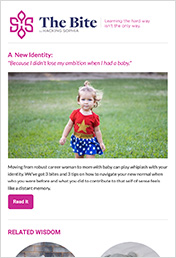I had a few milestones since becoming a working mom 10 years ago, which led to the moment I finally said, ‘enough is enough. Something needs to be done to better support professional mothers.’ Yael Bennaroch, Founder MOMforce
While we may feel fortunate to be able to continue to work, for many of us, forced WFH, 24/7 was not the flexibility we were looking for. But maybe it’s enabled a moment of reflection around what type of environment you want (or don’t want) to return to, once business as whatever it’s going to be resumes.
Perhaps being in a family supportive environment, where there’s flexibility to work from home or flexibility to go to parent-teacher interviews during the day or shifted hours has become increasingly important to you. Or, if you were already looking for a change, maybe you’re reconsidering what environment you want to be in, and the kinds of companies you’re looking at.
We spoke with Yael Bennaroch, founder of MOMforce and mother of 6, whose goal is to help more women remain in the workforce, doing what they love while they care for those they love. They connect working moms with employers who truly walk the walk when it comes to inclusion and diversity. She shared her wisdom around assessing and securing roles that allow you to bring your full self to work and that are a fit for your total life.
Awareness of MOMforce is a wake-up call to working moms (and dads) that they can consider if their company, even if they’ve been there for years, may not be a fit. Yael Bennaroch
What To Do (Bites)
-
Know what really matters to you.
For many women, understanding that MOMforce (and the roles they help fill) even exists has been a wake-up call of sorts where they’re motivated to ask themselves: is this the company that I really want to be with in the future? Do its core values, policies and way of operating align with mine? Do I feel I can bring my full self to work or do I have to hide my family so there’s no misinterpretation around my priorities or work ethic?
You have to decide what really matters to you. Then, as you think through it, consider what benefits and policies matter. Depending on your lifestage, family situation, career goals, and personal values, flexibly might be important – try to pinpoint the kind of flexibility that meets your needs. Is it more important that you can work from home one day a week or that it’s culturally acceptable to leave mid-day to watch a play or come in at 7:00 am and leave every day at 3:00 pm?
-
How to Assess: Think data points and culture.
It’s not hard to identify the most progressive family supportive companies. It is part of their narrative. They win awards, their leaders are recognized for it. They speak on panels, at conferences, invest it in through the appointment of a Chief Diversity Officer or similar title. Aside from the very top of the list of acknowledged companies, how can you really know?
Check policies and stats: What are their mat leave, return to work, flexibility programs? Do they have mentorship programs for women? How active and how broad-based are the programs? What percent of the board (public companies), leadership team, senior managers are women? The average number of women on boards in Canada is now approximately 20%. Where do they sit? The most progressive companies are vocal about striving for equal representation of males and females in both leadership positions and board seats.
And, it also comes down to culture. This is the experience you’ll live. The company may have the benefits, but if it’s not embedded in the culture, you may be reluctant to take advantage of those benefits for fear of judgement or penalty. This is where you need to understand culture – which goes beyond how an individual boss operates. So, ask these kinds of questions:
- How would you describe your company’s culture?
- Every company has stated values, how is yours walking the talk?
- How are people evaluated?
- Who gets rewarded/promoted?
-
And, your messaging while interviewing is essential.
It’s always important how you position yourself as a candidate. For many women, ‘hard work’ is a work ethic that they take pride in but the emphasis on effort over impact can be undermining. Impact is what should matter, not how long you’re at your desk or hours in the office (which they tend to be short on anyway).
By focusing your narrative on impact over effort, outcomes over task completion, developed expertise you bring, you’re emphasizing how you produce results based on capabilities and leadership, not how hard or how long you work. When asked about your leadership style, you can focus on the following, for example:
- I believe in:
- Outcomes: Focus on results
- And, how outcomes are achieved: It’s not about command and control but bringing teams together with a common mission and goals
- Enabling others in getting things done
- Finding the brilliance in people and developing talent: Everyone has their unique brilliance. It’s the job of a leader to find it, nurture it, and build a team with complimentary brilliance
- I believe in:
Tips
-
Do a reality check on whether it’s your current environment or how you are defining what’s acceptable and what’s not. Are you making assumptions on whether you can leave a few minutes early or have you actually asked? Many assume the answer is no before asking the question. If you’re happy in your role but need more flexibility, start by telling your manager what you need – you may be surprised what they’ll agree to. If the conversation has been had, and it’s a no – then maybe it’s time to look elsewhere.
-
To ask or not to ask? Many grapple with the question of whether to be overt in the interview process about having a family and how that affects what you value and are looking for in a company. First, that’s what MOMforce is there for – they do the asking. That being said, my advice; if whatever policy or benefit is so important to you that you’re prepared to be rejected by a company because of it – ask. If this works against you, you won’t be happy there anyway.
-
Consider the nature of the industry: Some industries by definition have long hours or the necessity to be there, regardless of the hour, for relevant business reasons. Then you have to ask yourself: if this is the industry you want to be in, where is there room for flexibility? Every day is not a peak period – is it acceptable to take a morning off?
My Choice. My Wisdom.
Yael, you have 6 kids, so you must be the queen of getting the right things in place to make it work. What are your pillars to making it all work?
- Have clear priorities: For me, it’s my family, my faith, my career.
- Be proactive: I always try to plan ahead. Both in my home life and work life so that I can better manage my time.
- Ask for help when you need it.
- Attitude of gratitude: even when things don’t go to plan and times are tough, I always try to be grateful for what I have and see the beauty and opportunity in every challenge.
Think about your first couple of kids, what do you wish you would have known then that you know now about a) being a parent, and b) managing work/life?
To lower my standards, being a good parent is not about being perfect. When I had only 1 child, every box had to be checked off. As an infant, my eldest daughter was the best dressed baby. She had a huge birthday party with 100 guests when she was only 2 years old. Her daily routine was down to a science. Today, after 6 kids, things look a little different. My twins may be in PJs most days, but they are happy and playful and are learning new things each day. My older kids are kind, helpful, successful and they get along! (Most of the time). I just have a better appreciation for what is truly important.
With all the juggling and challenges you must face in managing work and life, what keeps you going on the work front?
I truly feel like MOMforce is helping so many women feel confident that they can have it all, a fulfilling career and a family. Most importantly, I feel like I am (in a small way) contributing to a future where my 5 daughters won’t have to choose between raising a family and having unlimited professional options.
What do you wish your kids would say about you when they become adults?
My mother worked hard but we always felt that she put us first. No matter what.
Women speak less about legacy; how do you think about it?
I think about it a lot. I have this vision of being old and grey and sitting at a very large dining room table surrounded by our children and grandchildren. Raising them and helping them fulfill their life’s purpose is what I want my legacy to be. If I can grow my company and help thousands of women find fulfilling careers while balancing parenthood, that would be a great secondary legacy.
Now to MOMforce. Why MOMforce, Why now? Was there an epiphany moment?
I had a few milestones since becoming a working mom ten years ago, which led to the moment I finally said, ‘enough is enough. Something needs to be done to help better support professional mothers.’ Around 10 years ago, I was in the final round of interviews with a reputable company, when the SVP closed the doors and said, ‘off the record, I know you have one child, do you plan on having more? Because we invest heavily in our training and if you will be going on maternity leave in the future, then I need to know now.’ Needless to say, this was not the right environment for me.
While this incident really surprised me, I did not harp on it, and moved on to accept a great offer with P&G. Fast forward around 8 years and I was curious to see what other opportunities were out there for me. However, after speaking with several recruiters, it was evident that while I was more than qualified to apply for several roles they were mandated to fill, the topic of work flexibility was not well received. I was told to first apply and get the job before asking about the option of working from home or having the ability to leave around 4pm to pick up my kids (I obviously said that I would be making up the time either by starting earlier or working later from home). I could not bring myself to go through an interview process when my top priority was not being addressed in the hiring process.
While this experience planted a seed in my mind and made me feel like my options were limited, the idea for MOMforce was not yet born. It wasn’t until one of my closest friends told me that she felt guilty for telling her employer that she was pregnant, where I felt very triggered. I realized that well educated, hard working women still felt, and at times rightfully so, like they were doing something wrong for aspiring to have a challenging and meaningful career while also having and raising a family. I had this conversation with my friend when I was 9 months pregnant with my twins. It wasn’t the most opportune timing, but something sparked inside of me and this is where my journey to help give moms confidence to apply to companies where they felt both respected and accommodated came to be.
Over the last year, I have formed strategic partnerships with tier 1, family friendly companies that highly support MOMforce’s mission of keeping women in the workforce after having children. The companies understand that offering accommodations that they were already extending (like work from home policies, flex hours etc.), but intentionally communicating them in the hiring process, was getting them access to top talent that may have not otherwise applied.
What has been the biggest AHA as you started in this space?
It was obvious to me which companies truly walked the talk about increasing their female representation by how quickly they responded to me – and who in the organization responded to me. When the president of a major multinational company emails me directly about 20 minutes after I reached out to a member of their leadership team, you know that helping professional mothers is a priority for them.
Who are the women you’re hearing from?
Awareness of MOMforce is a wake-up call to working moms (and dads) that they can consider if their company, even if they’ve been there for years, may not be a fit. I have been contacted by both moms and dads who have been out of the workforce for a while as well as actively working parents who are looking for more viable, flexible work options.
What’s your hope for the future?
With our current situation, lots of companies may be rethinking their WFH policies. Systems will be in place to enable it. Investments are being made in laptops, monitors for home, etc. Companies will see it’s possible for teams to engage remotely.
I strongly believe that after this pandemic is behind us, many companies will be much more equipped and open to offering more remote job opportunities.
Thank you Yael. And thank you for all you’re doing to support working moms!



